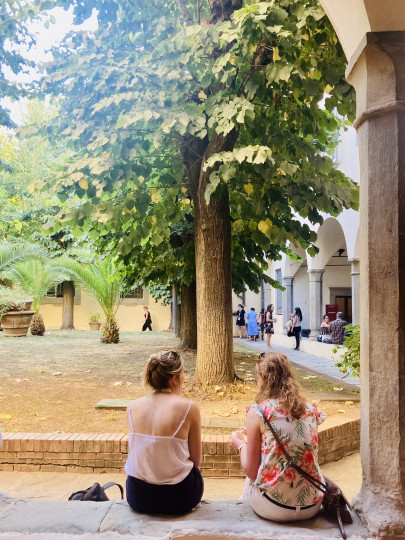Conference report: EUROCRIM2023, Florence
In 1817, during his visit to Florence, Stendhal described an experience of intense heartbeat, confusion, fainting, and even hallucinations. These are documented psychosomatic reactions of tourists and visitors of Florence when beholding the fantastic architecture and artworks or when witnessing the extraordinary beauty of the place. This medical condition became known as Stendhal’s syndrome. The French author seems to have described his reaction to frescoes and paintings as a sublime ecstasy, and, since that date, the syndrome has been registered by Italian doctors (Bamforth, 2010). While I had no notice of any of the participants at this year’s conference in Firenze, having felt such strong reactions to the city, it was clear, from looking into social media or chatting with people in the conference venues, that there was a general sense of awe.

The location at the heart of the city centre, with venues perfectly mixing Renaissance and modernity, helped everyone feel welcomed and at ease, strolling between gelato and the next panel. With temperatures around 30º and a new record in the number of participants, some rooms were a bit too crowded and warm, reflecting the topics' high relevance and the attendees' commitment to be present in the various sessions. The program of the 2023 annual conference was packed with a total of 473 sessions, including pre-arranged and regular sessions and book launches. The ESC Working Group meetings were also intense and very participated. The sheer number of activities made it necessary to start earlier on Wednesday and include sessions during lunch hours. But the buzz and speed of such a vast conference could always halt if one decided to enjoy the shade in the gardens of Fuligno and Congressi/Affari.
The plenaries were well attended, and the topics were diverse and engaging. Being in Italy, an incursion into the historical origins of Criminology was expected, and we had that by Barbara Gualco at the opening ceremony and by Paul Knepper in his amazing plenary about the life and work of Lombroso. However, current times, with their speed and “liquidity”, creating new conditions and phenomena that need new explanations, should not hinder criminologists from analysing novelty while it is happening, as Fernando Miró-Llinares defended by asking criminologists to continue studying even “during the earthquake”. Klaus Boers had already offered a comprehensive approach to life-course Criminology, an absolute masterclass on the topic that summarised the most important developments in the approach and its relevance in the study of youth delinquency; and Georgia Zara argued on the need to address ‘emotional topics’ such as sex offending based on scientific evidence and professional ethics. The plenaries also included an original perspective of Asian criminology by Jianhong Liu, who helped European scholars know more about how Criminology is developing in the continent while providing examples of concrete and relevant research. Finally, the plenaries of Saturday were dedicated to discussing two very different forms of violence or offences in two very different contexts. While Witold Klaus referred to the forms of violence deployed at Eastern borders and directed towards people of colour, Giovanna Laura De Fazio provided an overview of the phenomenon of gender-based violence and sexual harassment in Academia. The diversity of topics and perspectives was organised in plenaries according to the geographic affiliation of the speakers but also revealed the amplitude of research subjects and approaches to criminology.
Florence also testified to the recomposition of the board, with a new President-Elect, Michele Burman, and a new at-large board member, Anna Di Ronco, while Josep Tamarit-Sumalla addressed for the first time the ESC members in his new role of President. In his first speech, Josep stressed how openness is a feature of Europe and Criminology.
2023 was not only a record-breaking year in the number of participants at the annual conference, but it also witnessed an impressive number of submissions to the ESC awards. The juries had their work cut out as they analysed high-quality papers, books and CVs to select the 2023 awardees. The European Criminology Award went to Uberto Gatti, and the acceptance speech and laudation are published in this newsletter, revealing his vibrant contribution to Criminology worldwide. The jury considered that “Professor Gatti has had a stellar academic career over four decades, making him one of the most impactful and respected criminologists in Europe and, indeed, globally”. The ESC Young Criminologist Award was awarded to Jakub Drápal for his original and critical work on the sentencing of ‘multiple conviction offenders’ (those who re-offend in the phase prior to serving their previously imposed sentences), offering an “exploration of normative questions regarding the principles of sentencing, including proportionality, retributivism, censure, and consequentialist approaches”. A summary of his research interest is offered in this issue.
The European Journal of Criminology Best Article of the Year Award was offered ex-aequo to Alberto P. Chrysoulakis in recognition of his article “Morality, delinquent peer association, and criminogenic exposure: (How) does change predict change?”, published in issue 19/5 (pp 623-642) of EJC and to Leonidas Cheliotis for his article “Depression and repression: Global capitalism, economic crisis and penal politics in interwar Greece?”, [MOU2] published in issue 19/3 (pp 419-441) of the same journal. The jury considered that Alberto’s paper offered a comprehensive empirical study providing “a strong example of theory-driven research applying an innovative theoretical framework to a rich longitudinal dataset to test an important and fundamental relationship at the heart of the explanation of criminal behaviour, applying an insightful and multifaceted analytical approach to studying the key relationships and how those relationships change interactively over time”. And Leonidas’ article stood out because it provides “an in-depth analysis of historic events and machinations that while analysed within a particular sociohistoric context – Greece from 1928-1932 – have particular relevance in contemporary European contexts regarding links between economic affairs and government-driven discourse and policies relating to punishment.”
The ESC Early Career Award recognises the outstanding scientific achievement of an early-career European criminologist, and this year was granted to Anna Sergi, with the jury considering that “the impressive body of work as a researcher in her early career clearly meets and exceeds the standard of ‘outstanding scientific achievement’. Aside from a large number of high-quality publications, the originality of her research is also attested to by the number of external research grants and awards received”. Finally, the ESC Book Award went to Assessing the Harms of Crime: A New Framework for Criminal Policy (Oxford University Press, 2022) authored by Victoria A. Greenfield and Letizia Paoli, and considered by the jury as a groundbreaking contribution to the development of criminological research in a field that has received little attention both at a theoretical and empirical level, offering solid elements to place harm as a conceptual framework for empirical research, criminal policy and normative decisions.

Florence was the perfect balance between hard work and the informal coming together of criminologists from all over Europe and other continents. In “X” (former Twitter), people were challenged to find the most perfect terraza in the city. Offline, in the evening and after the conference ended, EUROCRIM participants congregated to enjoy the amazing Italian cuisine, architecture and art.
The annual conference of the ESC in Florence was the materialization of what Italo Calvino once wrote in his book The Invisible Cities: “You take delight not in a city's seven or seventy wonders, but in the answer it gives to a question of yours.” Florence has more than seven or seventy wonders; and work presented during EUROCRIM2023 certainly helped answer a series of questions about all sorts of criminological topics. Future paths of research now lay ahead in preparation to EUROCRIM2024 in Bucharest.
References
Bamforth I. (2010). Stendhal's Syndrome. Br J Gen Pract, 60(581), 945–6. doi: 10.3399/bjgp10X544780. PMCID: PMC2991758.
